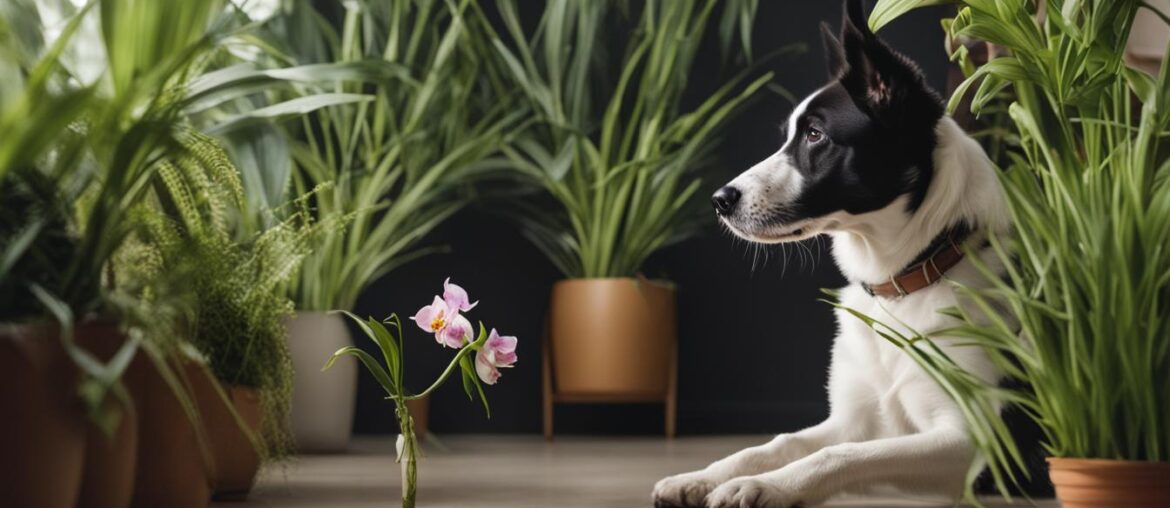As a dog owner, it’s natural to be concerned about the safety of your furry friend, especially when it comes to household plants. Orchids, known for their exquisite beauty and wide range of varieties, are a popular choice for many plant enthusiasts. But are orchids poisonous to dogs? Let’s explore this topic and provide you with the essential information to keep your dogs safe around these captivating flowers.
Key Takeaways:
- Many orchid species are non-toxic and considered pet-friendly for dogs.
- However, certain varieties of orchids and rose plants can be toxic if ingested.
- To ensure your dog’s safety, it’s important to know which orchid species are safe and which should be avoided.
- Consult the ASPCA’s list of non-toxic flowers to ensure you choose safe options for your canine companion.
- Monitor your dog’s behavior and consult a veterinarian if you suspect your dog has ingested a toxic plant.
Non-Toxic Flowers for Dogs: Pet-Friendly Options
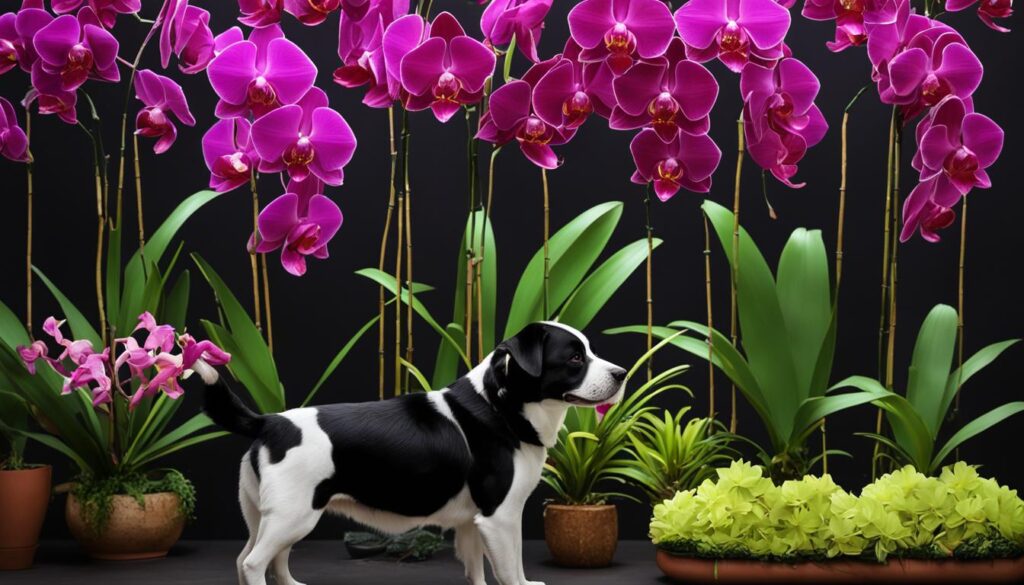
When it comes to creating a dog-friendly environment, it’s important to choose plants and flowers that are safe for your furry friends. The American Society for the Prevention of Cruelty to Animals (ASPCA) provides a comprehensive list of non-toxic flowers and plants that are suitable for dogs. Among these pet-friendly options are several orchid species that you can safely keep in your home or garden.
Here are some common orchids that are safe for dogs:
- Brazilian Orchid
- Crimson Cattleya
- Christmas Orchid
- Cirrhopetalum
- Cocktail Orchid
- Dancing Doll Orchid
- Easter Cattleya
- Fiery Reed Orchid
- Scarlet Orchid
- Florida Butterfly Orchid
- Ghost Leafless Orchid
- Golden Lace Orchid
- Golden Shower Orchid
- King of the Forest Orchid
- Lace Orchid
- Leopard Orchid
- Lily of the Valley Orchid
- Pansy Orchid
- Phalaenopsis Orchid
- Rainbow Orchid
- Spice Orchid
- Tailed Orchid
These orchids not only add beauty and elegance to your home but also provide a safe and dog-friendly environment for your beloved pets.
Orchids That May Be Toxic to Dogs
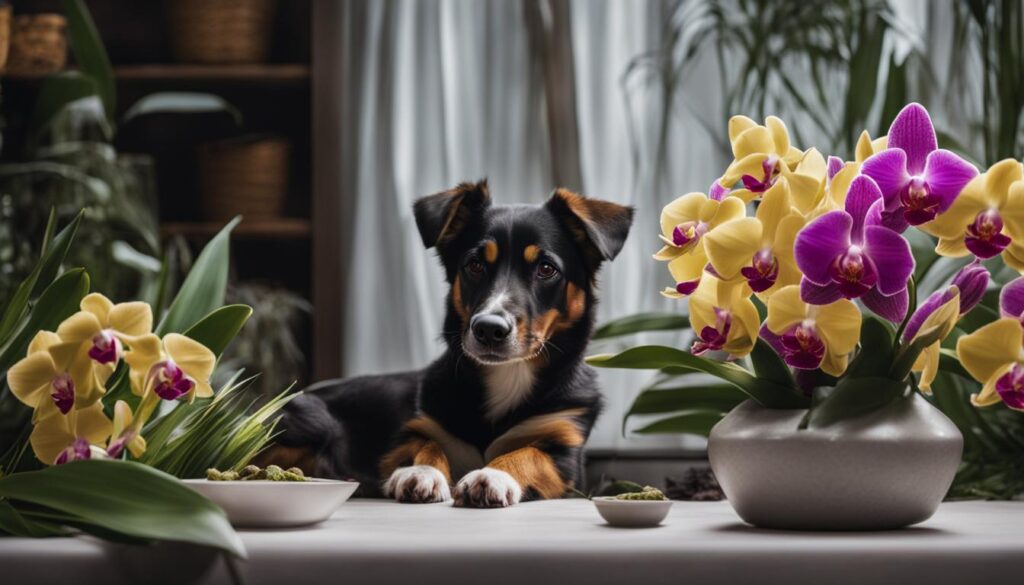
While many orchids are safe for dogs, there are some orchid species that can be toxic if ingested. It is important to be cautious and avoid the following orchids when you have dogs in the house: Primrose, Christmas rose, Desert rose, Rosebay, and Moss rose (a succulent). These orchids have potential toxicity risks for dogs and should be kept out of their reach.
Why should you be cautious with these orchids?
These orchid species contain substances that can be harmful to dogs if ingested. Dogs may experience various symptoms of orchid toxicity, including gastrointestinal upset, vomiting, diarrhea, lethargy, and even more severe reactions in some cases.
It’s essential to prioritize the safety of your furry friends by avoiding these toxic orchids and opting for dog-safe alternatives. By choosing pet-friendly orchids, you can enjoy the beauty of these plants without worrying about any potential harm to your dogs.
Tips to Keep Your Orchids Safe from Dogs
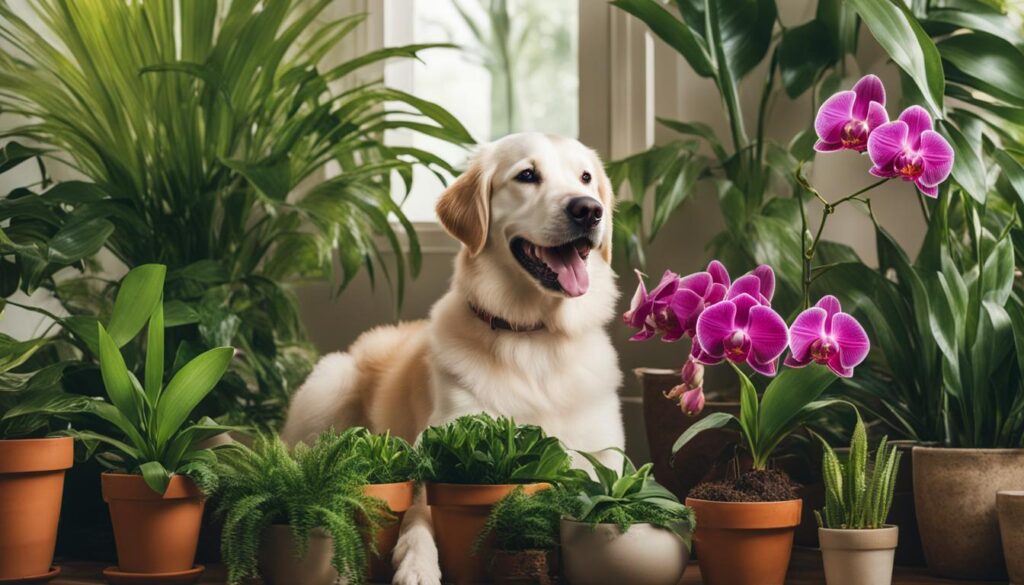
To ensure the safety of your orchids and dogs, it is important to take certain precautions. Here are some tips to keep your orchids safe from dogs:
- Place your orchids in areas that are inaccessible to your pets, such as high shelves or hanging baskets. This will prevent your dogs from accidentally knocking them over or munching on the leaves.
- If you have large dogs that can reach high places, consider using plant stands or placing your orchids in rooms that are off-limits to your pets.
- Consider dusting the leaves of your orchids with cinnamon powder or cayenne pepper. The smell is unpleasant to cats and dogs and can act as a natural deterrent, preventing them from approaching the plants.
- Use baby gates or create physical barriers to keep your dogs away from areas where you have your orchids. This is especially important if you have puppies or dogs that are particularly curious.
- If you have multiple orchids, consider grouping them together in a dedicated area. This can help you monitor them more effectively and prevent accidental encounters with your dogs.
“By implementing these tips, you can create a safe environment for your orchids and ensure the well-being of your furry friends.”
Pet-Friendly Flowers and Plants for Dogs
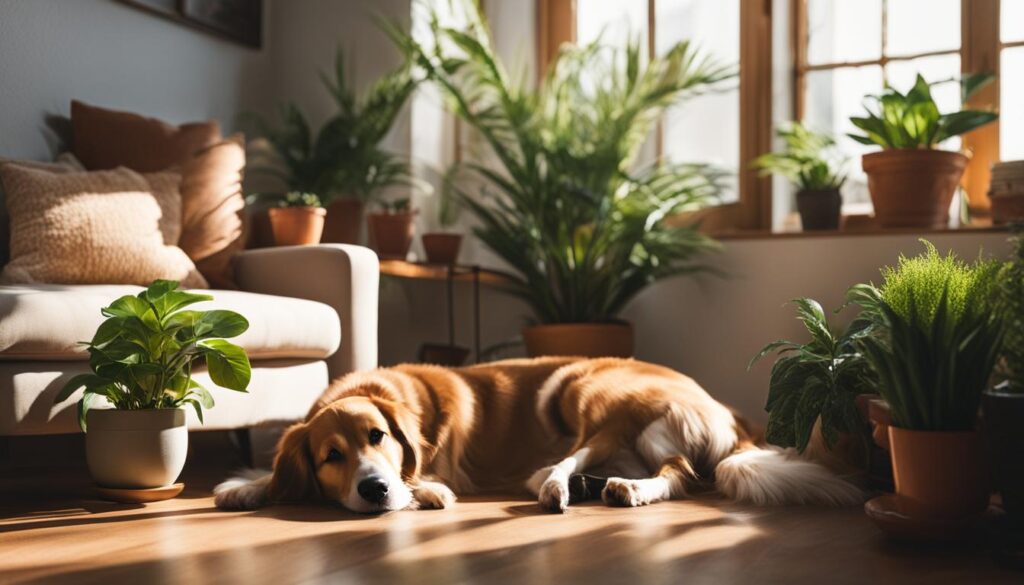
In addition to orchids, there are other pet-friendly flowers and plants that are safe for dogs. Here are some examples of dog-friendly houseplants and garden plants that can be enjoyed without worrying about any potential toxicity risks:
- Sunflowers
- Petunias
- Celosia
- Zinnia
- Aster
- Marigolds
These flowers can be a colorful and vibrant addition to your home or garden, creating a dog-friendly environment where your furry friend can freely explore without any harm. Whether you prefer the bold beauty of sunflowers or the delicate charm of petunias, these dog-friendly plants offer a safe and enjoyable experience for both you and your canine companion.
Symptoms of Plant Poisoning in Dogs
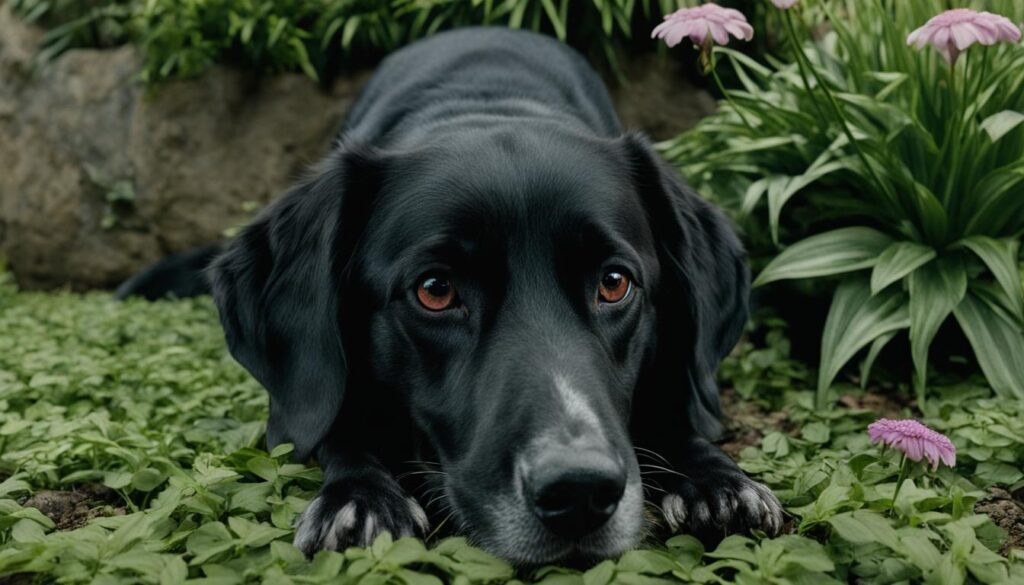
If a dog ingests a toxic plant or flower, they may experience various symptoms of plant poisoning. These symptoms can range from mild to severe and may include:
- Lethargy
- Loss of appetite
- Vomiting
- Drooling
- Dehydration
- Uncontrollable urination or thirst
- Depression
- Bleeding gums
- Agitation
- Black or bloody stools
- Nosebleeds
- And more
If you suspect that your dog has ingested a toxic plant or flower, it is important to consult with a veterinarian. Immediate medical attention may be necessary to mitigate the effects and provide appropriate treatment.
Common Toxic Flowers to Avoid for Dogs
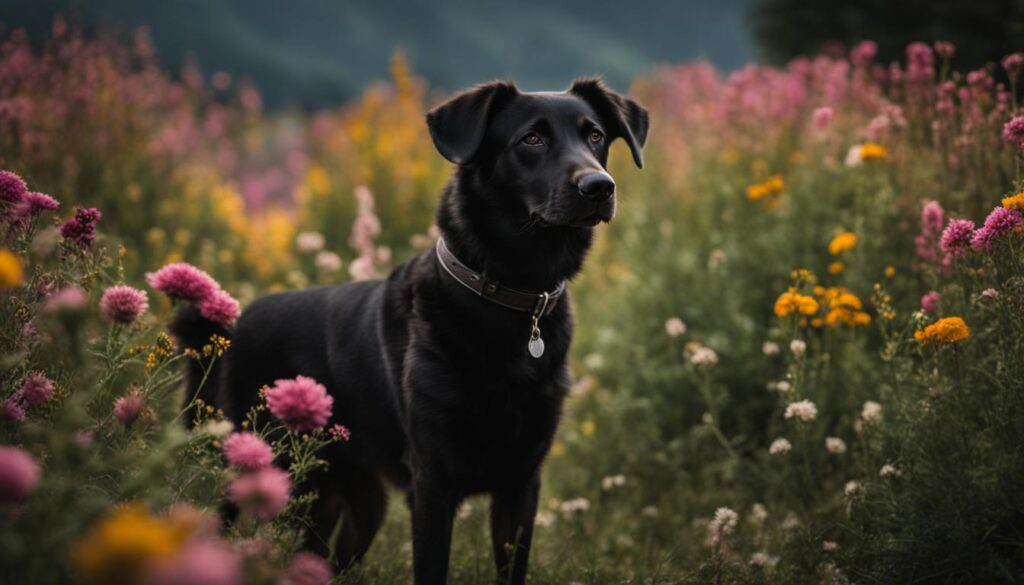
In addition to orchids, there are several common flowers that are toxic to dogs and should be avoided. Some examples include:
- Azalea
- Birds of Paradise
- Tulips
- Daffodils
- Iris
- Poinsettia
- Oleander
- Narcissus
- Wisteria
These flowers can cause various symptoms of plant poisoning in dogs and should not be kept in a dog-friendly environment.
Flowers to Watch Out For:
“Azalea can cause vomiting, drooling, and diarrhea in dogs if ingested. Birds of Paradise can cause gastrointestinal upset and can be toxic to the heart. Tulips contain toxins that can cause nausea, vomiting, and even tremors, especially if the bulbs are ingested. Daffodils contain toxins that can cause vomiting, diarrhea, and even cardiac arrhythmias. Iris bulbs can cause vomiting and diarrhea, along with potential drooling and difficulty swallowing. Poinsettias, while not as toxic as once believed, can still cause mild gastrointestinal upset in dogs. Oleander is highly toxic and can cause severe toxicity in dogs, affecting the heart and even leading to death in some cases. Narcissus can cause vomiting, salivation, and abdominal pain. Wisteria can cause gastrointestinal upset, including vomiting and diarrhea.”
What to Do If Your Dog Ingests an Orchid
If your dog eats an orchid, immediate action is crucial to ensure their safety. Follow these steps:
1. Remove any remaining plant material
First, carefully remove any orchid plant material from your dog’s mouth to prevent choking or further ingestion.
2. Contact your veterinarian or animal poison control hotline
Next, reach out to your veterinarian or an animal poison control hotline for expert guidance. They can provide specific instructions based on the situation and advise you on the best course of action to take.
3. Do not force your dog to vomit
Contrary to popular belief, it is not recommended to induce vomiting in dogs without professional guidance. Instead, provide plenty of water to help flush out any remaining plant material.
4. Follow the advice of a professional
Ensure you follow the advice provided by your veterinarian or the animal poison control hotline. They may suggest monitoring your dog’s symptoms or recommend seeking veterinary care.
5. Monitor your dog’s symptoms
Keep a close eye on your dog for any unusual symptoms or behavior changes after ingesting the orchid. Look out for signs of digestive upset, such as vomiting or diarrhea, as well as any signs of distress or discomfort.
In case of any concerns or if you observe worsening symptoms, it is advisable to seek veterinary care promptly.
In situations involving the ingestion of potentially toxic substances, it is always better to err on the side of caution and seek professional advice. Your veterinarian is the best source of information and guidance to ensure your dog’s health and well-being.
Preventing Dogs from Eating Plants
To prevent dogs from eating plants, there are several measures you can take.
- Keep plants out of their reach: Place plants in areas that are inaccessible to your furry friends. This can include high shelves, hanging baskets, or rooms that are off-limits to dogs.
- Use deterrents: Certain scents can deter dogs from approaching plants. Consider placing citrus peels or coffee grounds around the plants, as dogs often find these smells unpleasant.
- Provide distractions: Dogs may be less likely to eat plants if they have other entertainment options. Provide toys, chew bones, or interactive puzzles to redirect their attention away from the plants.
- Train your dog: Teach your dog to leave plants alone by using positive reinforcement techniques. Reward them when they ignore the plants and redirect their attention to appropriate behaviors.
- Protect your plants: Use barriers or safe plant covers to physically prevent dogs from accessing the plants. This can include fencing, plant cages, or mesh barriers.
By implementing these strategies, you can create a dog-friendly environment while ensuring the safety of your plants.
| Deterrent | Description |
|---|---|
| Citrus Peels | The smell of citrus is often disliked by dogs and can deter them from approaching plants. |
| Coffee Grounds | The strong smell of coffee can discourage dogs from getting near plants. |
| Training and Distraction | Teaching your dog to focus on toys, chew bones, or other forms of entertainment instead of plants. |
| Barriers and Covers | Physical barriers such as fencing or plant covers can prevent dogs from accessing plants. |
Why Are Pets Attracted to Plants?
Pets, including dogs, may be attracted to plants for various reasons. Some dogs may be curious and explore their surroundings by chewing or ingesting plants. Certain plants may also have appealing smells or tastes to dogs, and they may be attracted to the textures and colors of flowers. It is important to provide appropriate chew toys and entertainment for dogs to prevent them from seeking stimulation from plants.
Do Pets Need to See a Vet After Eating an Orchid?
If your dog eats an orchid, it is advisable to consult with a veterinarian. While orchids are generally safe for dogs, ingestion can still cause digestive upset or potential blockages. A vet can provide guidance based on the specific circumstances, including the type of orchid ingested, the amount, and the dog’s current behavior. It is important to monitor your dog’s symptoms and seek veterinary care if needed.
Wrapping Up
Orchids can be a beautiful addition to your home without posing a significant risk to your dogs. Many orchid species are non-toxic and pet-friendly, allowing you to enjoy their beauty while keeping your furry friends safe.
However, it is important to be aware of any potential risks and take precautions to ensure the well-being of your dogs. By choosing dog-safe orchids and implementing strategies to keep plants out of their reach, you can create a safe and dog-friendly home environment.
Remember to research the specific orchid species that are safe for dogs and avoid any toxic varieties. Additionally, consider placing your orchids in areas that are inaccessible to your pets, using deterrents if necessary, and providing alternative sources of stimulation to prevent them from being attracted to the plants.
With these precautions in place, you can enjoy the beauty of orchids while ensuring the safety and happiness of your canine companions.
FAQ
Are orchids poisonous to dogs?
Orchids are generally safe for dogs and considered pet-friendly. However, some varieties of orchids can be potentially toxic if ingested. It is important to be aware of the specific orchid species that are safe and those that should be avoided.
What are some non-toxic flowers for dogs?
Some orchid species that are safe for dogs include Brazilian Orchid, Crimson Cattleya, Christmas Orchid, Cirrhopetalum, Cocktail Orchid, Dancing Doll Orchid, Easter Cattleya, Fiery Reed Orchid, Scarlet Orchid, Florida Butterfly Orchid, Ghost Leafless Orchid, Golden Lace Orchid, Golden Shower Orchid, King of the Forest Orchid, Lace Orchid, Leopard Orchid, Lily of the Valley Orchid, Pansy Orchid, Phalaenopsis Orchid, Rainbow Orchid, Spice Orchid, and Tailed Orchid.
Which orchids may be toxic to dogs?
Orchids such as Primrose, Christmas rose, Desert rose, Rosebay, and Moss rose (a succulent) can be toxic to dogs if ingested.
How can I keep my orchids safe from dogs?
To keep your orchids safe from dogs, you can place them in areas that are inaccessible to your pets, such as high shelves or hanging baskets. You can also consider dusting the orchid leaves with cinnamon powder or cayenne pepper, as the smell is unpleasant to cats and dogs and can deter them from approaching the plant.
What other flowers and plants are safe for dogs?
Other pet-friendly flowers and plants for dogs include sunflowers, petunias, celosia, zinnia, aster, and marigolds.
What are the symptoms of plant poisoning in dogs?
Symptoms of plant poisoning in dogs can range from mild to severe and may include lethargy, loss of appetite, vomiting, drooling, dehydration, uncontrollable urination or thirst, depression, bleeding gums, agitation, black or bloody stools, nosebleeds, and more.
What are some common toxic flowers to avoid for dogs?
Common toxic flowers for dogs include azalea, birds of paradise, tulips, daffodils, iris, poinsettia, oleander, narcissus, and wisteria.
What should I do if my dog ingests an orchid?
If your dog ingests an orchid, you should remove any remaining plant material from their mouth to prevent choking and contact your veterinarian or an animal poison control hotline for guidance.
How can I prevent dogs from eating plants?
To prevent dogs from eating plants, you can keep plants out of their reach by placing them in areas that are inaccessible, use deterrents such as citrus peels or coffee grounds, and provide distractions or toys to redirect their attention away from the plants.
Why are pets attracted to plants?
Pets may be attracted to plants for various reasons, including curiosity, appealing smells or tastes, and the textures and colors of flowers. Providing appropriate chew toys and entertainment for pets can help prevent them from seeking stimulation from plants.
Should pets see a vet after eating an orchid?
If your pet eats an orchid, it is advisable to consult with a veterinarian. While orchids are generally safe for dogs, ingestion can still cause digestive upset or potential blockages. A vet can provide guidance based on the specific circumstances and symptoms.
Wrapping Up
Orchids can be a beautiful addition to your home without posing a significant risk to your dogs. Taking precautions and choosing dog-safe orchids can help ensure a safe and dog-friendly environment.


